Do you want to enjoy Greece like a local? My guide on how to experience Greece from A to Z will definitely help!

How to Experience Greece from A to Z
Think of Greece, and chances are that a few words will come to mind. Many of them somehow start with the letter “s” – summer, sun, sea, sand, Santorini, souvlaki, sardines, and… strikes!
Greece is a lot more than that though. I’m Vanessa from Athens, and I love helping people experience my country. Here is my guide on Greece from A to Z!
A for Athens
Athens is an exciting city! The Greek capital is a mix of ancient temples, Byzantine churches, neoclassical buildings and hastily constructed blocks of flats. It is also home to bustling markets, busy streets, cute little tavernas and many, many cozy cafes.
Not everyone likes Athens. Some visitors say it’s chaotic and noisy, while others find it dirty. As most people only spend a couple of days in Athens, they never get to scratch the surface and discover the secrets of our wonderful city.
If you want to experience a different side of Athens, and find out more about life, culture and food, take a look at these guides:
- All the ancient sites in Athens – not just the Acropolis
- My walking tours in Athens – tailor-made to suit your interests
- Why visit Athens – or, in other words, all the reasons why I love my city!
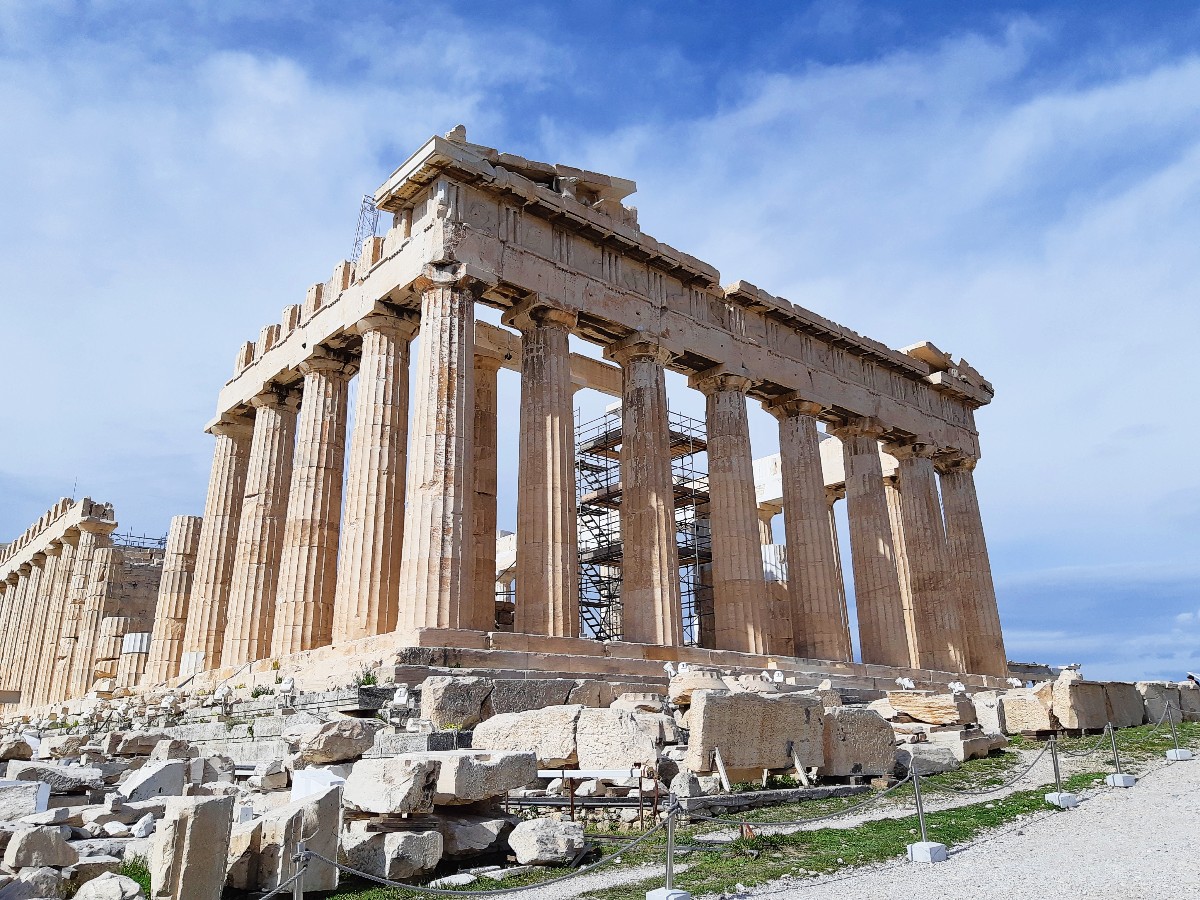
B for Beaches
Depending on the source you choose to trust, Greece’s coastline is either 13,676 or 15,147 kms (8,498 or 9,412 miles). For such a small country, this is a pretty impressive number. As you can imagine, Greece has literally thousands of beaches.
Between the long, sandy beaches in western Greece, the steep cliffs and tiny coves in the Cyclades and the rugged coastline in Crete, you will definitely find a Greek beach to call your favourite – until you visit a next one.
For a short list of some of my favourite beaches, have a look at this article on the best beaches in Greece. It’s work in progress!

C for Cats
Greek cats! They are colourful, playful and wonderful, and they seem to be everywhere.
While many Greeks seem to be totally oblivious to our furry friends, visitors are always surprised at how many cats there are in Greece. You will definitely spot cats everywhere, even in bigger cities like Athens.
You can read more about Greek cats in this article.
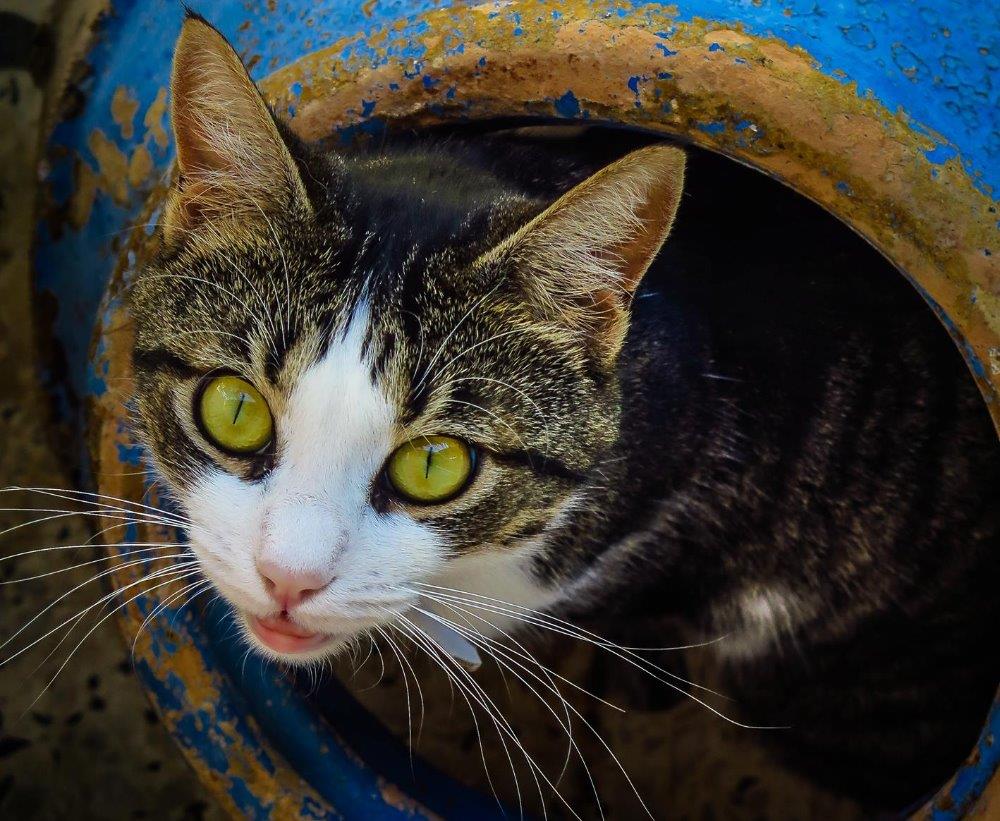
D for Driving
Many visitors wonder if they should hire a car while in Greece. In my opinion, just like any other country, much of Greece is best explored if you have your own transportation.
One thing you should know is that the road network in Greece is very variable. Many of the highways and national roads have been recently reconstructed and are in great condition. This is generally reflected on the number of toll stations, and the amount of money you will have to pay for tolls.
On the contrary, the local roads, especially the ones on the islands and on remote mountainous areas, are more difficult to navigate. Many of them are narrow, winding, and very steep in places – plus they often need paving or resurfacing. In addition, you are likely to come across various animals, such as goats and sheep.
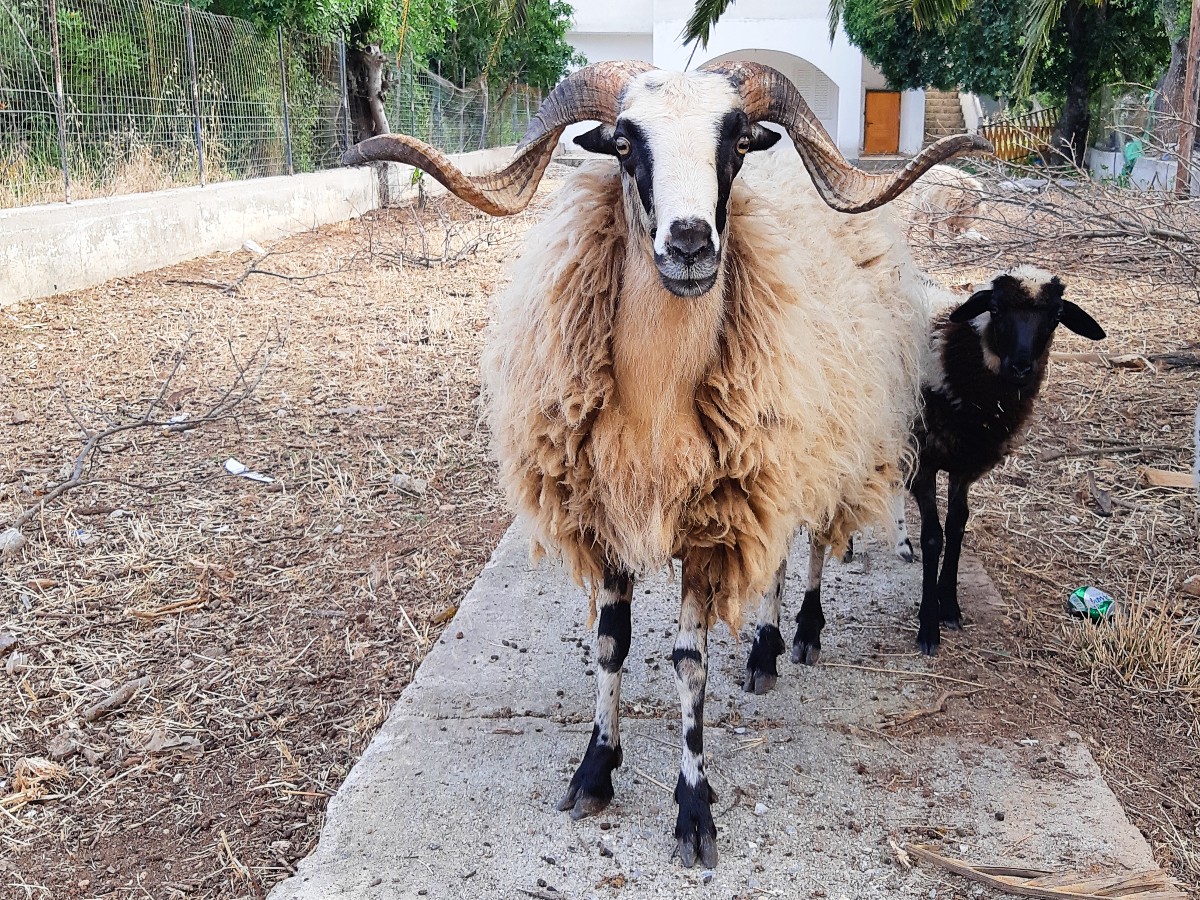
My article on driving in Greece explains everything about road rules, Greek drivers, and what to expect in terms of the roads.
Also, check out this guide: Do you need an International Driving Permit to drive in Greece.
As for car rentals, you can check prices on Discover Cars, an online platform where you can compare various models and book cars at competitive prices.
If you are not keen on driving in Greece, you can use trains and buses, and perhaps get a pre-booked transfer or taxi here and there.
Last tip: I would strongly suggest that you avoid driving in the big cities. If you are landing in Athens, you can rent a car at the airport, which is outside the center. Or you can hire the car in the center and ask the company to drive you to the city limits – many companies offer this service.
E for Easter
If you want to experience Greece at its best, or perhaps at its craziest, consider visiting for Greek Easter. There are several uniquw customs that Greeks take for granted, but visitors are amazed with.
As an example… Who in their right mind would put up whole lambs on the spit, and use up all their insides in a soup? Not everyone’s taste – literally! Definitely not mine!
One thing is certain – if you ever get the chance to experience a Greek Easter, you will remember it for your rest of your life! Here is a deep-down look at some of our Greek Easter traditions.
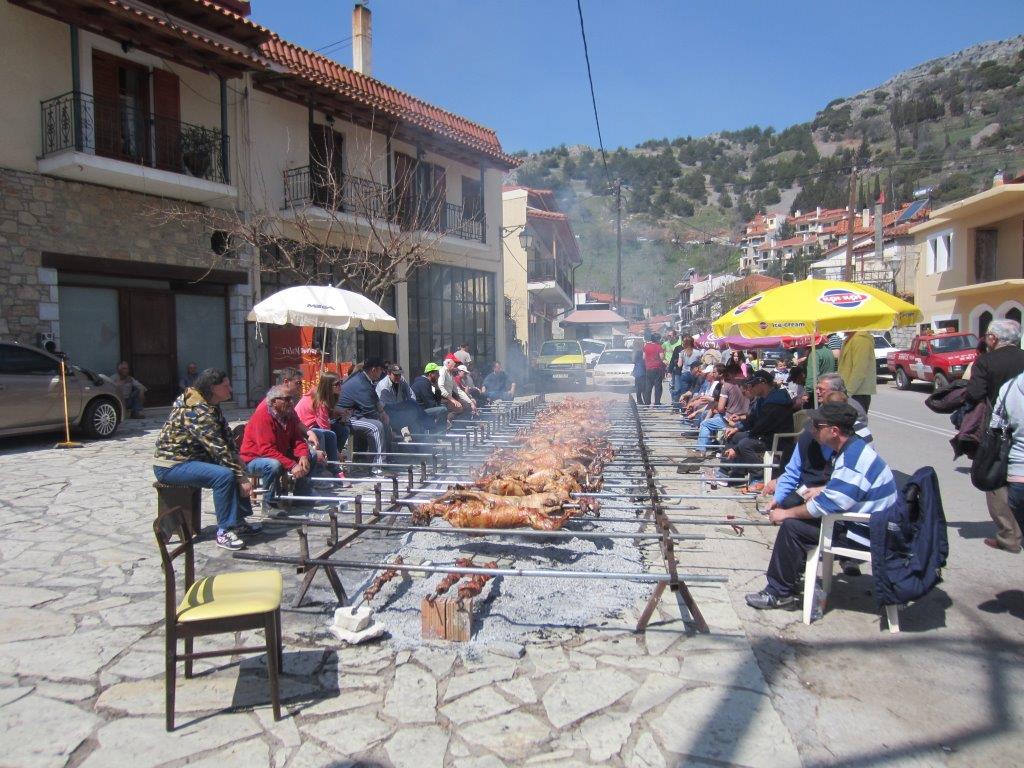
F for Food
You probably don’t need a special introduction to Greek food… or do you?
I’m sure that you’ve heard of the Greek salad, moussakas and souvlaki. But have you heard of kokkoras krasatos, stifado or gemista?
A great introduction to Greek food is this gourmet food tour in Athens. You will will taste lots of delicious dishes, and discover many delicacies that you haven’t heard of.
Of course, you can always read up on Greek dishes before you visit – here, you will find 50 popular Greek dishes to try!

G for Greek islands
Many visitors refer to “the Greek islands” as if they were a tiny group of islands that could be visited in one go. I’m sorry to say that very few people will manage to visit all the Greek islands in their entire lifetime!
According to some sources, Greece has around 6,000 islands. As per the 2011 census, 119 of them are inhabited. Therefore, if you visited three islands every year, you would need about 35 years to visit all of them.
With that said, I guarantee that there are many you’d love to return to once you’ve been there once – so start planning!
The Greek islands are split in several island groups, such as the Cyclades, the Ionian islands, the Dodecanese and the Sporades.
Travelling between two islands that belong to different groups can be complicated, and will involve at least one ferry ride and one flight or bus ride. So it’s best to combine islands that belong in the same group.
You should also know that islands that are geographically close on the map are not always directly connected to each other. Also, ferry services are limited in winter – this includes routes between the most popular islands.
Take a look here for some more tips:
- Island hopping in Greece
- How to take a ferry in Greece
- Tips for taking a flight to the Greek islands

H for History
For most Greek children, history class at school is a complete nightmare. It’s really difficult to go through so many thousands of years of history, let alone learn it. Names, facts and years can easily blur into the minds of even the cleverest students.
Greece has a really long history, going back to the Minoan civilization, dating from before 3,000 BC. Since then, several tribes and numerous conquerors have passed by the area that is known as “Greece” today.
The Classic Era, when the Acropolis and many of the other monuments were built in Athens, lasted for less than a couple of hundred years. It was followed by the Hellenistic Era, the Roman Era, the Byzantine Era and the Ottoman Era, which ended in 1821, with the Greek Revolution.
What most people don’t realize though, is that Greece as we know it today was only established in 1948, when Rhodes and the rest of the Dodecanese officially became a part of the country!
You can learn loads about Greek history in the many wonderful museums in Athens! Also, have a look at the history of the Greek flag.
Here’s another fun Greek word to learn if you don’t know it already: Horta!
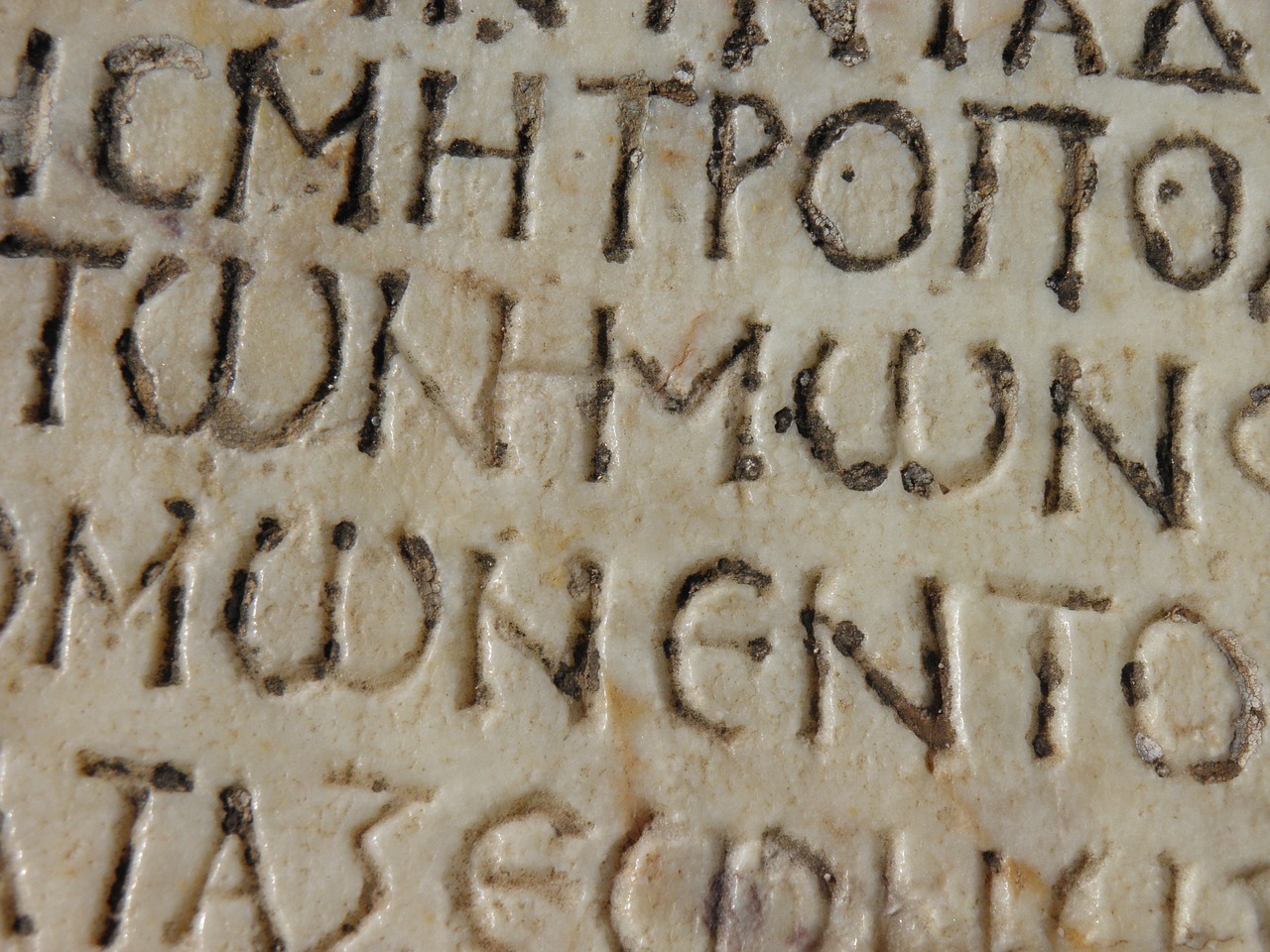
I for Idiot
In the English language, the word “idiot” is used to indicate a stupid person, or someone who has done something stupid. Have you ever wondered where the word came from?
In Ancient Greece, the word “idiotis” (ιδιώτης) was used to describe a person who had no interest in common affairs, and was only interested in his personal business. It could also be used for a person who had no education, and was strongly linked to an individual who was useless to society.
According to the laws, idiots would eventually be deprived of their political rights, which indicated how important voting was in Ancient Greece.
Next time you are feeling lazy to go and cast your vote, think about it – would this mean that you are an idiot? This is probably what Plato would say!
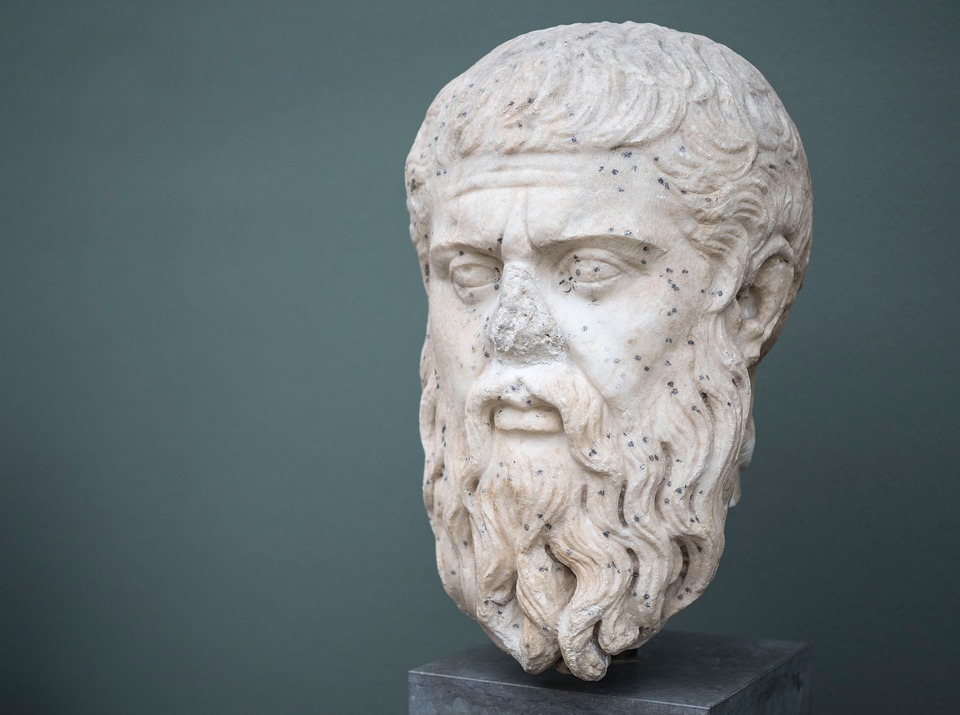
J for Jacket
Many people ask if they should bring a jacket if they are visiting Greece in summer. Even though Norwegians and Canadians will probably laugh, my answer is yes.
Sure, you will not need a jacket on the beach, but if you find yourself in an air-conditioned boat you will probably wish you had one. Similarly, if you are travelling around windy Cyclades, you will be surprised at how much the temperature drops at night, even in August.
Thinking about it though, every single Greek mother on the planet always asks her children to “take a jacket” – so maybe my advice is a little biased!
Here is a look at what to pack for Greece for every season.
K for Kalimera
Few words will bring up as many smiles in Greece as “kalimera” – good morning! This is a relatively easy Greek word, especially in terms of pronunciation. Memorize it, and impress everyone you meet with your language skills!
Here are a few more Greek words and phrases – have a look!
L for Lover
While this might be a controversial subject for some, I can’t really leave it out of the picture. After all, Greek mythology is full of stories of passion and love.
Many visitors have extended their stay to Greece because they met a special someone. You may think that this was just a summer fling. You will be surprised, however, at the number of foreigners living on the Greek islands today.
Whether they are still with that special someone they met several decades ago, is another matter altogether.
If you want to uncover an unexpected side of Greece in the 80s, have a look at this amusing and eye-opening video.

M for Mythology
While it was very tempting to use the famous “malaka” word here, I chose to make a reference to Greek Mythology. Our beautiful land has an incredibly rich selection of myths, legends and stories tied to it.
Ancient Greek Mythology revolves around the Ancient Greek Gods. Apart from the 12 Olympian Gods, there are literally thousands of lesser gods and deities, demons, nymphs, demi-gods, fairies, heroes and other fictional (?) creatures.
There are endless stories about those characters, proving not only the importance of religion, but also the incredibly fertile imagination of the Ancient Greeks.
Here is one of my favourite stories: How did Athens take its name? A fascinating myth
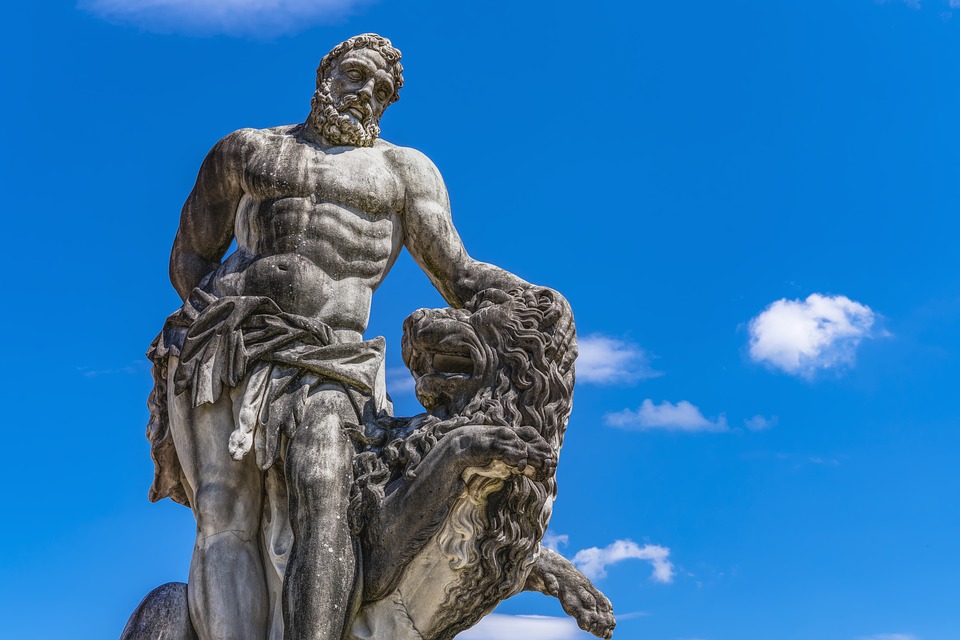
N for Nightlife
Greece is famous for its nightlife. Places like Mykonos, Ios, Laganas in Zakynthos, Malia in Crete, Faliraki in Rhodes and many others always feature among the best party places in Europe.
Depending on the age range you best associate yourself with, you will definitely find some nightlife to suit your interests.
That isn’t to say that wild clubbing and crazy drinking is easily found everywhere in Greece. It is perfectly possible to have a quiet holiday, even at the most popular destinations. After all, Greece is what you make of it!

O for Ouzo, Octopus and Olive Oil
Arguably the most famous Greek drink, ouzo is a strong alcoholic drink flavored with aniseed. It is normally served with ice cubes and maybe water, and tastes better when consumed by the sea. Ouzo is meant to be sipped rather than gulped down, and it’s meant to be shared in good company.
And guess what goes well with Ouzo? Octopus, served with some extra virgin Olive Oil! An acquired taste, or perhaps an acquired texture. Take it, or leave it!
Here is some more information about Greek ouzo. Also, have a look at a few other drinks you can have in Greece.
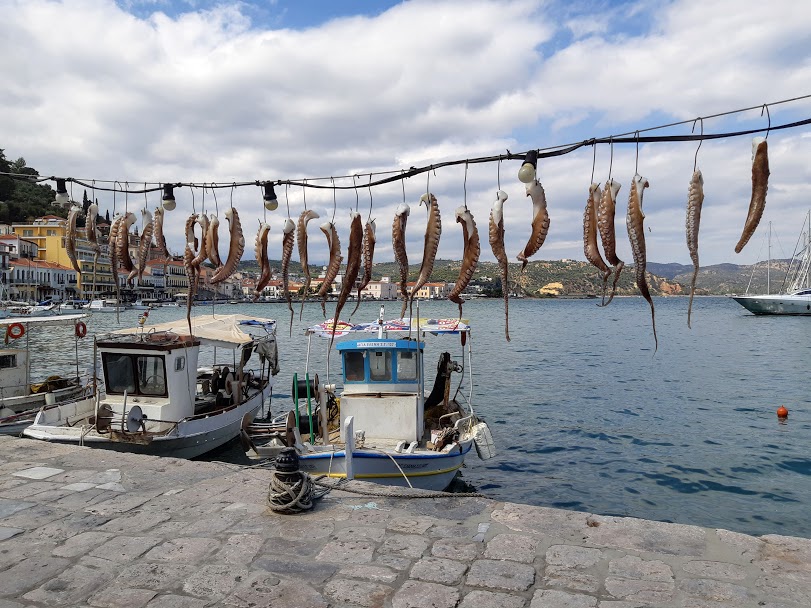
P for Philosophy
Think of Greek Philosophers, and several names will come to mind. Plato, Socrates, Heraclitus, Aristotle, Pythagoras, Epicurus, Epictetus, Diogenes and dozens of other philosophers were Greek.
You will be surprised at how relevant some of their belief systems and quotes about Greece are today!!!
Here is one that I really like, by Plato – “Once you’ve started something, you’re half way there”.

Q for Queuing
If your culture appreciates orderly queuing, you may have a bit of a shock the first time you visit Greece. It may sound like a stereotype, but Greeks don’t like queuing. We sometimes tolerate it as there is no other choice, but deep down… many of us don’t really like it.
If you are a Greek reading this, you might disagree. Well – I encourage you to remember the last time you went to a bank, the post office, a doctor’s, or the supermarket. Sure, maybe you waited in line… but were you happy to wait?
Did you perhaps ask the person in front of you to offer you their place? Did a fight start out of nowhere, even if you weren’t involved? And how about that yellow traffic light you didn’t stop at? Just saying…
R for Religion
Religion has always been of great importance in our country. It was a huge thing in Ancient Greece, where it was tied to pretty much all legends, traditions and social activities.
During the Ottoman Era, the Christian Orthodox religion was in stark contrast with Islam, and was one of the things that kept the country united against the invaders.
Generally speaking, religion remains a pretty big thing today in Greece. There are several religious events throughout the year all around the country. Some of them are of huge social and cultural importance, especially in smaller towns and villages.
At the same time, it’s not uncommon for Greeks, especially the younger ones, to self-identify as atheist, agnostic or just not practicing.
Here is some more information on Religion in Greece.

S for Siga siga
If there is one thing you might want to take back home from Greece, is the “siga siga” way of life – slowly slowly! You will see this especially in the smaller towns, when people may still stop for a long lunch break, or even take the children to the beach after work.
Greeks like to enjoy life, and will take a couple of hours’ break just to have a coffee with a friend. Here is some more information on the Greek coffee culture.
Don’t get me wrong – this is not everyone’s lifestyle. Many people, especially in the cities, lead very busy lives. Still, the mentality of “siga siga” is ingrained in many Greek people’s DNA. Go to any village or town in Greece, and just watch the locals – they are happy to take their time, and never rush.
Another useful word starting with s is the word “strike”. I hate to say it, but if you visit Greece, make sure you follow any strike announcements. They don’t happen everyday, but they might affect your trip. I post about them on my FB page.
And as for the word “Souvlaki“? I guess you knew that one already!
T for Toilet Paper
You’ve probably heard this before. In many parts of Greece, the sewage system is a little dated. This means that you shouldn’t put anything in the toilet bowl that might cause clogging! This includes all sanitary products, including toilet paper.
This is fairly common in many countries around the world, but for people who have only travelled to Western Europe it might come as a shock. All I can say is that it’s not as bad as it sounds, once you are used to it.
Trust me – if you put the toilet paper down the toilet, you might actually be up for a very unpleasant surprise.
This doesn’t apply everywhere. Many newer buildings, especially in cities, have modern sewage pipes, just like where you live. However, on most of the islands and villages, systems are old-fashioned. When in doubt, just use the bin.
Here’s my full guide on why you shouldn’t flush the toilet paper in Greece. Also, have a look at some more strange facts about Greece.

U for UNESCO monuments
Greece is home to 18 UNESCO monuments. Apart from the well-known Acropolis and Meteora monasteries, there are quite a few lesser known ones, that are spread out around our country.
The ancient sites of Mycenae, Epidaurus, Delphi and Delos are all UNESCO World Heritage Sites. It’s no surprise that they receive thousands of visitors every year.
For a complete list of the UNESCO monuments in Greece, check out the official UNESCO website.
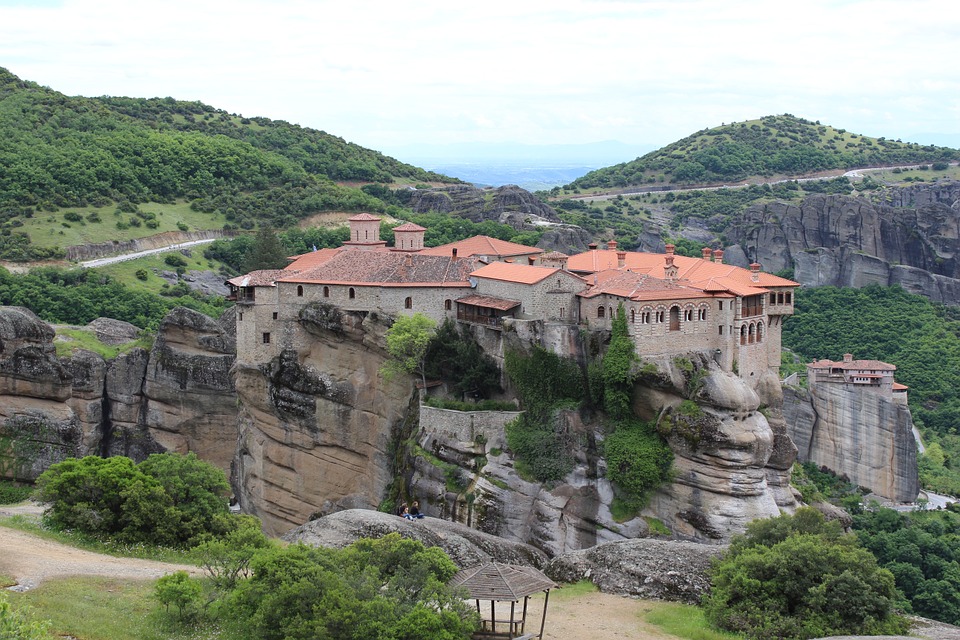
V for Vegetarian and Vegan
Many visitors stress over whether restaurants in Greece cater for vegetarians and vegans. Don’t worry – Greece is one of the most vegan friendly countries in Europe.
This is partly due to the religious fasting and partly due to our diverse plant ingredients like fruit, vegetables, pulses and legumes, which are the basis of the Mediterranean diet.
Traditional Greek tavernas will offer a selection of dishes based on vegetables, so you will have no problem at all. I am not vegetarian, but I tend to order many vegetarian dishes at tavernas that I very rarely cook at home.
Even grilled meat places will typically serve a couple of starters that are suitable for vegans, and in the worst case scenario you can always get by with a tomato and cucumber salad, some olives and a large portion of fries.
Best thing? When you want a snack, there will always be a bakery at walking distance!
Have a look at these two guides for more information:

W for Weather
Many people are surprised when they hear that Greece has over 20 ski centres! While many visitors associate Greece with summer, our country has a Mediterranean climate.
This means that we have hot, dry summers and relatively mild winters, at least when compared to North Europe.
That said, parts of Greece can get very cold. The lowest temperature ever recorded in Greece was in the area of Ptolemaida in 1963, and it was an incredible -27.8 C / -18 F. No, it’s not a typo!
In my opinion, the best time to travel to Greece is either in late spring, or in early autumn. September is a great month if you want to make the most of the beaches, without the crowds or the scorching August sun.
Have a look at this article on the best time to visit the Greek islands!

X for Xenoglossy
X is a famously difficult letter, but I am seriously not making this word up. “Xenoglossy” is the ability to speak a language that you have not actually learnt.
Now think of all these words that you use on an everyday basis. School, cinema, psychology, photography, democracy, athlete, graphic, centre, symbol.
Did you know that all these words were of Greek origin? It turns out that you speak some Greek – you just don’t know it!
Here are a few more tips on the Greek language, and a list of popular English words with Greek roots.

Y for Yacht
While you can easily island hop by ferry, many people prefer to sail around Greece. This is a great way to check out the coastline, especially the islands, and get to places that you can’t reach if you are travelling by land.
While sailing boats are popular with visitors, you will be surprised at the number of private yachts you will see all around Greece. The Ionian Islands in particular are extremely popular, as the winds are not as strong as they are around the Cyclades.

Z for Zorba
Think Greek dancing, and chances are that one movie character will come up. This would be Anthony Quinn in one of the most famous movies about Greece ever, Zorba the Greek.
This great movie presents a contrast of attitudes between a younger English visitor and an older Greek man. It is based on an excellent book by the famous Greek author Nikos Kazantzakis.
While the movie describes Greece during an era long gone, there are several elements that still ring true today. You can watch the famous closing scene with the syrtaki dance here.
Here are some more movies about Greece which I’m sure you’ll love.

How to experience Greece from A to Z
And now that you know everything about Greece from A to Z, have a look at this article at the best souvenirs from Greece.
How many of these words had you thought of? And can you think of any others? Do let me know down in the comments!
 Hi! I’m Vanessa from Athens. I hope that you have enjoyed this little guide of Greece from A to Z! Follow me on my social media:
Hi! I’m Vanessa from Athens. I hope that you have enjoyed this little guide of Greece from A to Z! Follow me on my social media:
- Facebook page and very active Facebook group
- Amazon


As accurate as it gets! you should refer to “malaka” though… 😀
HAHAH actually it was my original intention… maybe I should update the article 😀
thanks!
Great information, thank you for writing all this information. I will refer to often.